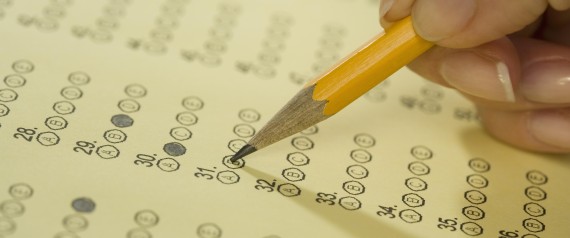Here's an Easy Test to Find Out If You're Anti-Gay (And Maybe Don't Even Know It)
Posted: 12/16/2013 12:14 pm

This one, which was written by Brandon Ambrosino and appeared on The Atlantic on Friday, argues that just because someone isn't "sure about marriage equality" doesn't mean that he or she is anti-gay.
Ambrosino writes:
As a gay man, I found myself disappointed with this definition -- that anyone with any sort of moral reservations about gay marriage is by definition anti-gay. [If this is true] then that means my parents are anti-gay, many of my religious friends (of all faiths) are anti-gay, the Pope is anti-gay, and -- yes, we'll go here -- first-century, Jewish theologian Jesus is anti-gay.I'm less interested in specifically discussing marriage equality (but, for the record, if you think that queer people shouldn't be able to get married, then yes, you are anti-gay) and more interested in a subtler (or not-so-subtle) assumption and mistake that Ambrosino makes about the acceptance and understanding of queer people by our society.
Further into the piece he notes:
If it's "anti-gay" to question the arguments of marriage-equality advocates, and if the word "homophobic" is exhausted on me or on polite dissenters, then what should we call someone who beats up gay people, or prefers not to hire them? Disagreement is not the same thing as discrimination. Our language ought to reflect that distinction.It may be tempting to look at homophobia as some rarely glimpsed, cartoonish evil that only reveals itself during hate crimes or appearances by the Westboro Baptist Church. But when we conceive of homophobia as a boogeyman responsible for only the most obvious and egregious horrors, we miss the finer, nuanced, harder-to-see -- and therefore in some ways more dangerous -- moments that are also homophobic (however "polite" they might seem) and have very real consequences.
So, to clear up any confusion, here's an easy test to see if you're anti-gay:
- If you have a gay friend (or sister or coworker or...) but still think that queer people should not be able to get married, then you are anti-gay.
- If you're fine with queer people as long as you don't have to see them kissing or holding hands, then you are anti-gay.
- If you don't have anything against queer people but wouldn't want a gay man leading your son's scout troop, then you are anti-gay.
- If you think that inside queer people there is anything lurking -- however small -- that causes us to have any less integrity or humanity than straight people have, then you are anti-gay.
You might not be "malicious" or marching in front of a pride parade with a poster that reads, "Fags Doom Nations," but you're still part of the problem, and if we all know what's good for us, we will no longer excuse your behavior no matter how good or kind you may otherwise be.
I know that's probably a terrifying thing for some people -- even for some queer people -- to read and process. And I get that. We've been trudging through the muck of a homophobic society for hundreds and hundreds of years, and we've been told that so much of what queer people do is unnatural or corrupt or destructive that it can't be easy for some people to slough all of that off. And if you're still struggling with some of this stuff, it doesn't necessarily make you a monster or even a bad person. It just means you've got some work to do, and it's time that you got to it.
And it's time that we started drawing some lines in the sand. It's time that we made a promise to ourselves that we won't look the other way any longer. It's time that we started challenging each other and ourselves to be accountable to what we believe and what we espouse.
While we're at it, let's start calling bullshit when we see it. We aren't doing anyone any favors when we know something is untrue and explain it away as being about freedom of expression or freedom of religion. Sure, you can say whatever you want, but that doesn't mean we have to accept it or allow it.
And let me also take this moment to call bullshit on Ambrosino and any other queer person who excuses anti-gay thinking. Whether he realizes it or not, he is anti-gay. And yes, you can be queer and also anti-gay. Internalized homophobia is a very real thing, and even the most vigilant of us can succumb to it. But we can't coddle that kind of thinking any longer.
It's scary to challenge the people we love. It hurts to consider what could happen when we confront them and tell them that we will no longer accept anything less than truly unconditional love that embraces us exactly as we are. But how much is it worth? How much are we worth? And when we think about the alternative, do we really have any other choice?
This is one test we can no longer afford to fail.
